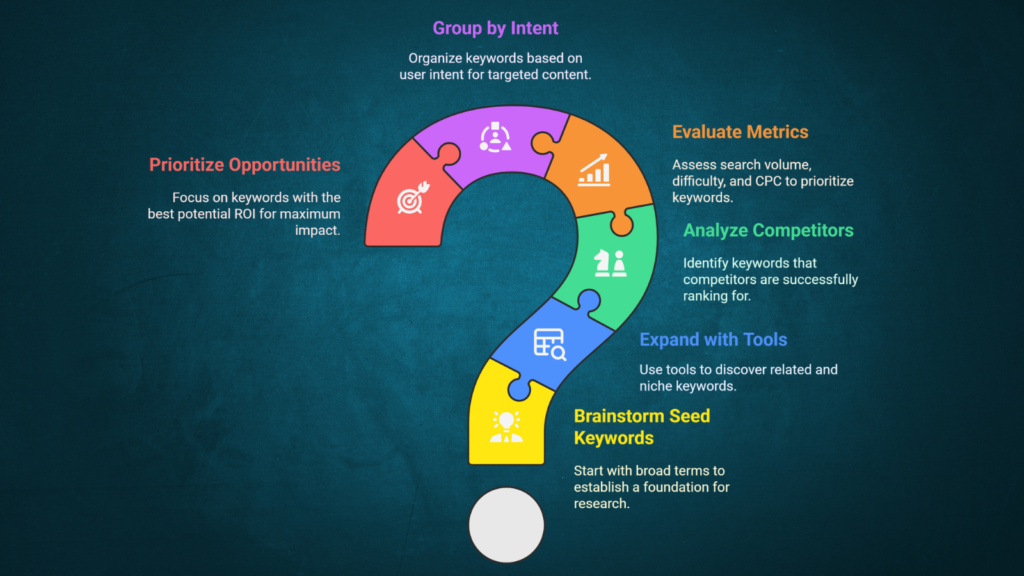
Welcome to our comprehensive guide on keyword research, the cornerstone of any effective SEO strategy. In this article, we’ll explore everything from basic concepts to advanced techniques, helping you master this essential skill for improving your website’s visibility in search results.
SEO Keyword Research: Understanding the Fundamentals
Effective keyword research forms the foundation of any successful SEO strategy. But what exactly is it? At its core, keyword research is the process of discovering and analyzing the terms and phrases that people type into search engines. This information helps you understand what your potential audience is looking for, allowing you to create content that meets their needs.
Types of Keywords
Keywords generally fall into several categories:
- Short-tail keywords: Brief, general terms (1-2 words) like “shoes” or “pizza”
- Long-tail keywords: More specific phrases (3+ words) like “women’s running shoes for flat feet” or “best pizza delivery in Brooklyn”
- Primary keywords: Main terms you want to rank for
- Secondary keywords: Related terms that support your primary keywords
When conducting keyword research, always consider both search volume and user intent. Understanding not just what people are searching for, but why they’re searching, is crucial for creating content that truly resonates.
Key Components of Keyword Analysis
Proper SEO keyword research involves analyzing both competitors and user search behavior. When evaluating keywords, pay attention to:
- Search volume: How many people search for this term monthly
- Keyword difficulty: How hard it will be to rank for this term
- Search intent: What users are trying to accomplish (informational, navigational, transactional, or commercial)
- SERP features: What appears on the search results page (featured snippets, knowledge panels, etc.)
- Relevance: How closely the keyword aligns with your content and business goals
The goal of SEO keyword research is to find terms with high search volume but manageable competition. This balance is key to achieving SEO success.
How to Do Keyword Research: A Step-by-Step Guide
Learning how to do keyword research properly takes time but delivers long-term SEO benefits. Here’s a systematic approach to get you started:
- Brainstorm seed keywords: Start with broad terms related to your business or topic
- Expand with tools: Use keyword research tools to find related terms
- Analyze competitors: See what keywords your competitors are ranking for
- Evaluate metrics: Look at search volume, difficulty, and CPC
- Group by intent: Organize keywords by user intent
- Prioritize opportunities: Focus on keywords with the best potential ROI

When figuring out how to do keyword research, start with your own knowledge of your industry. Your expertise can guide you toward terms that might not show up in tools but are valuable to your audience.
Advanced Research Techniques
Beyond the basics, several sophisticated methods can enhance your keyword research:
- Seed Keyword Analysis
- Start with core terms related to your business
- Use these as a foundation for expanding your keyword list
- Consider different perspectives and synonyms
- Competitor Analysis
- Identify gaps in your keyword strategy
- Discover new opportunities
- Understand your market positioning
- Intent Mapping
- Categorize keywords by intent (informational, navigational, transactional)
- Create content that aligns with each intent type
- Match keywords to appropriate stages of the buyer’s journey
Choosing the Right Keyword Research Tool for Your Needs
A comprehensive keyword research tool should provide data on search volume, difficulty, and SERP features. Choosing the right keyword research tool depends on your specific needs and budget. Let’s look at some popular options:
Premium Tools
- Semrush
- Price: $139.95/month
- Features: Keyword Magic Tool with a database of 25+ billion keywords
- Best for: Comprehensive SEO analysis and competitor research
- Ahrefs
- Price: $129/month
- Features: Keywords Explorer with extensive filtering options
- Strength: Excellent backlink analysis integration
- Moz Pro
- Price: $49/month
- Features: Keyword Explorer with difficulty metrics
- Strength: User-friendly interface and community support
Google Keyword Planner: The Essential Starting Point
Google Keyword Planner remains one of the most widely used tools for discovering new keyword opportunities. While Google Keyword Planner is free, it requires an active Google Ads account to access all features. Despite this limitation, it provides valuable data directly from Google, including:
- Search volume ranges
- Competition levels
- Suggested bid amounts
- Historical trends
- Related keywords

A good keyword planner provides data on search volume, competition, and seasonal trends. Using a keyword planner regularly helps you stay ahead of changing search patterns.
Keyword Planner Alternatives Worth Considering
If you’re looking beyond Google’s offering, consider these alternatives:
- Ubersuggest: Offers limited free searches with paid plans starting at $29/month
- Wordtracker: Focuses on long-tail keywords with plans from $27/month
- KeywordTool.io: Provides suggestions from various search engines with plans from $69/month
Keyword Research Tool Free Options That Actually Work
Many keyword research tool free options offer limited but valuable data for beginners. Despite limitations, a keyword research tool free version can still provide useful insights. Here are some effective free options:
- Google Trends
- Shows relative popularity of search terms over time
- Great for identifying seasonal trends
- Offers regional interest data
- AnswerThePublic
- Visualizes questions people ask about your keywords
- Limited free searches per day
- Excellent for content ideation
- Keyword Surfer (Chrome Extension)
- Shows search volume directly in Google search results
- Provides related keywords
- Offers content length suggestions
Best Keyword Research Tools Compared for 2025
The best keyword research tools offer a balance of comprehensive data and user-friendly interfaces. Investing in the best keyword research tools can significantly improve your SEO outcomes. Here’s how the top tools compare in 2025:
| Tool | Price | Database Size | Unique Feature |
|---|---|---|---|
| Semrush | $139.95/mo | 25B+ keywords | Keyword Magic Tool |
| Ahrefs | $129/mo | 10B+ keywords | Clicks metric |
| Moz Pro | $49/mo | 500M+ keywords | Keyword Difficulty score |
| Mangools | $49/mo | Not specified | User-friendly interface |
| Serpstat | $69/mo | 20B+ keywords | Clustering feature |
YouTube Keyword Research: Special Considerations
YouTube keyword research requires understanding the unique way people search on the platform. Unlike Google, YouTube searches often:
- Focus on how-to content and tutorials
- Include terms like “review,” “tutorial,” or “guide”
- Contain more conversational phrases
Specialized tools for YouTube keyword research can help identify trending video topics. Tools like TubeBuddy, vidIQ, and Keywords Everywhere offer YouTube-specific data to help optimize your video content.
Keyword Research for SEO: Advanced Techniques
Effective keyword research for SEO balances search volume with competition levels. As you become more comfortable with basic keyword research, try these advanced techniques:
- SERP Analysis
- Examine what’s currently ranking for your target keywords
- Identify content gaps and opportunities
- Understand what Google considers relevant for specific queries
- Keyword Clustering
- Group related keywords together
- Create comprehensive content that targets multiple related terms
- Improve topical authority
- Trend Analysis
- Monitor seasonal fluctuations in search volume
- Identify emerging topics in your industry
- Create content ahead of trend curves
The most valuable keyword research for SEO focuses on understanding user intent. By aligning your content with what users actually want, you’ll achieve better rankings and more engaged visitors.
Common Mistakes to Avoid in Keyword Research
Even experienced SEO professionals make mistakes. Here are some common pitfalls to avoid:
- Strategic Errors:
- Selecting irrelevant keywords that don’t match your business
- Over-focusing on high-volume terms regardless of competition
- Choosing too few keywords, limiting your opportunities
- Improper keyword allocation across your site
- Technical Mistakes:
- Ignoring search intent behind keywords
- Neglecting to analyze SERP features
- Avoiding long-tail keywords due to lower volume
- Overlooking customer language and terminology
Best Practices for Keyword Research Success
To maximize the effectiveness of your keyword research:
- Research Foundation:
- Conduct thorough keyword research before creating content
- Analyze competitors regularly to find new opportunities
- Align keywords with search intent
- Evaluate and update your keyword strategy quarterly
- Implementation Strategies:
- Focus on relevant terms that match your business goals
- Balance search volume with competition
- Consider user intent for each keyword
- Monitor rankings and adjust strategy as needed
Conclusion: The Ongoing Process of Keyword Research
Keyword research isn’t a one-time task—it’s an ongoing process that requires regular attention and updates. Search trends change, competition evolves, and your business goals shift over time. By making keyword research a regular part of your SEO strategy, you’ll stay ahead of these changes and continue to attract the right visitors to your site.
Remember that the ultimate goal isn’t just to rank well but to connect with people who are looking for what you offer. When you understand and address the needs behind the searches, you create content that not only ranks well but also converts visitors into customers.
Ready to start your keyword research journey? Begin with the free tools mentioned above, then consider investing in premium options as your skills and needs grow. With consistent effort and the right approach, you’ll master this fundamental SEO skill and see real results for your website.